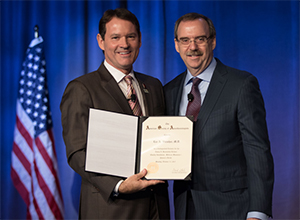
2016-17 ASA President Jeffrey Plagenhoef, M.D., FASA, (left) with Lee A. Fleisher, M.D.
Using measurement to improve outcomes is all the rage in modern medicine. Many medical specialties, including anesthesia, are collecting data, so the next step is to coordinate those measurements and include the feedback of patients, said Lee A. Fleisher, M.D., on Monday during the Emery A. Rovenstine Memorial Lecture.
Dr. Fleisher focused on four key messages in the effort to improve the quality of care — measurement, joint accountability, ownership of the journey and the patient voice. He is Chair of the Department of Anesthesiology and Critical Care at the Perelman School of Medicine of the University of Pennsylvania.
Anesthesiologists have been lauded for their efforts to improve safety and outcomes for patients, but they need to do more, he said. They have collected data measuring a plethora of outcomes, which Dr. Fleisher displayed. However, he emphasized the data are incomplete.
“There is something missing here. What is missing is surgical outcomes, it is perioperative outcomes,” Dr. Fleisher said. “We need to take ownership in that arena.
“The idea of what’s important goes directly attributable to anesthesia, but that is just a small part of it. But if you add in what we can jointly be accountable for … there is a lot of opportunity, particularly in the postoperative period.”
Dr. Fleisher said he sees improving outcomes after surgery as a system with multiple factors, including patient comorbidities, the anesthesiologist and the surgeon. Anesthesiologists can step up their role in this system by learning from data how to improve their performance and becoming more engaged overall to improve surgical outcomes.
“We need to take that shared accountability with not only processes we control, but outcomes we can influence,” he said, adding that all perioperative team members need to be involved, including patients.
Anesthesiologists need to do more than be part of the system, though. They need to take more ownership in the journey. For example, they need to react to the many concerns about cognitive declines after surgery. The ASA’s Perioperative Brain Health Initiative may become an important element in that ownership role.
The initiative was formally launched during ANESTHESIOLOGY 2017. The Brain Health Initiative website includes resources that members of the perioperative team can use to help optimize cognitive recovery, said Dr. Fleisher, who also is the Chair of the ASA Ad Hoc Committee on Brain Health Initiative.
“At least 40 percent of the delirium is actually preventable,” he said, as he described some of the initiative’s goals.
A final piece of the overall brain health effort is to be aware that patient expectations have changed dramatically. Dr. Fleisher encouraged anesthesiologists to be more empathetic in addressing patients’ problems and concerns.
Medical institutions are increasingly seeking feedback from patients using surveys and mobile apps, and medical professionals need to listen to that feedback. For example, surgical teams often are so involved in preoperative conversation that they can forget about the patient on the table, he said.
“The question is, can we control that?” Can we help make a difference?” Dr. Fleisher asked. “They are not bad people, they are just not cognizant of what patients want. Daniel Goleman (medical science writer) says, ‘True compassion means not only feeling others’ pain, but being moved to help relieve it.’”
Awards presented before Rovenstine Lecture
Several awards were presented Monday before the Emery A. Rovenstine Memorial Lecture. They were:
- Distinguished Service Award: Norman A. Cohen, M.D., Oregon Health and Science Center
- Excellence in Research Award: Paul Myles, M.B., B.S., Alfred Hospital, Melbourne, Australia
- James E. Cottrell Presidential Scholar Award: Chad M. Brummett, M.D., University of Michigan
- Excellence in Education Award: Arnold J Berry, M.D., M.P.H, Emory University
- Nicholas M. Green Award for Outstanding Humanitarian Contributions: K.A. Kelly McQueen, M.D., M.P.H., Vanderbilt University Medical Center
